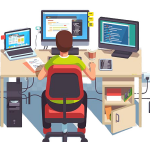Programming is termed as a process of creating a set of instructions that instructs a computer on performing a task. It can be done by using a various range of programming languages available these days i.e JavaScript, Python, C++, etc. Every language has its attributes, furthermore, these mainstream programmable languages are classified as called High-level programming languages due to the simplicity for the user to understand and utilize. Low-level programming languages are those which are harder for users to understand but understood directly by the machine such as assembly language. Now in this modern era of technology, programming has been integrated into performing everyday routine tasks varying from personal to professional usage owing to the rapid increase in consumerism. Therefore, it is correct to presume that programming is a highly technical and valuable skill set that is handy in today’s highly digitalized world. It is imperative to look at the positive aspects of teaching programming at a younger age as it refines them for tasks lying ahead.
Kids are surrounded by the influence of the digital world, by introducing the kids to coding, they gain an appreciation for the working of this digital world. They tend to make a rational approach that it is not magic that makes this world work, it is hard to embed mathematics given structure due to the software written and compiled. To quote Linus Torvalds “Many good programmers do programming not because they expect to get paid or get adulation by the public, but because it is fun to program”. Many of the benefits of enabling them to learn coding are developing skills for the future but speaking strictly in terms of educational terms, programming can promote a sense of healthy competition, and a rewarding environment. They will be one step ahead in the race for acquiring a rewarding skill. There is a high demand for people with coding skills in STEM fields or the tech industry so it would be very advantageous for educational institutions to give a directional push to their students that will only increase their options in pursuing a career in either of those.
Children tend to have a creative outlook that makes them more eager to learn about understanding and working in any environment they interact with. Their “out of the box” thinking coupled with interactive programming can form a new foundation of learning. The logical structure, progression, and results in programming can set young programmers up for success in later parts of their technical education. As Steve Jobs said, “everyone should learn how to code, it teaches you how to think.” So we see that there is an interlinkage between programming and logical thinking.
Programming has mathematics embedded in its fundamentals. Learning to program will also enable the trainees to learn mathematics. Visualizing abstract math concepts and real-time implementation of mathematics. One of the skills necessary for programming is computational thinking which involves logic building, algorithmic thinking, and the craft of breaking down a complex problem into smaller simpler manageable parts. Logically organizing and analyzing the data, computational thinking can be applied to a lot of other situations besides coding. It is a new way of solving practical problems.
Coding is a new method of expression, it enables the individual to build a range of skills such as problem-solving, algorithmic thinking, computational thinking, reasoning, and logic building, these skills compiled together to promote the student to communicate complex ideas through a newer simple medium that can be understood by the computer. This new form of expression is going to be very efficient for the student in all later stages of professional and personal life.
The ever-increasing smartphone apps’ saturation in our daily lives pervasively persuades the user at times that they should somehow make their mark in this trending online market for applications (Playstore, Apple store, Huawei store, etc). This trend is pushed by the need for competitive and efficient solutions to everyday problems. It is not wrong to assume that learning how to write a program (coding) can pay off in the future. Even non-programming jobs nowadays utilize the usage of applications behind their work.
Having a sound technical knowledge of programming, a person can use these to bring their creative ideas to life, think of Facebook as an example, it ushered in an era of socializing and communication just due to the miracle of programming. Now, these dreams can be given shape by the power of coding skills, by developing applications, programs, games, etc in solving real-world issues. Applying the knowledge of mathematics and programming, one can build their application to get a job done and provide this application as a solution to the rest of the users and consumers in the form of an application or a program. As Maria Klawe said “Coding is today’s language of creativity. All our children deserve a chance to become creators instead of consumers of computer science.”
By listing all these various advantages of learning to code and program, it can be extracted that this skill can empower a student to develop their application which could be a lifelong passion or a demand that due to the wonders of the program can finally be met. Analogous to learning to ride a bike, learning to code is easier for a young person, they can learn the basic concepts of computing, furthermore, learning to code is getting easier and interesting as there are new user-friendly software and updated instructional methods. There are online platforms to provide virtual mentorship for programmers learning to program. Kids will not require to spend hours of studies, they can walk through it step by step due to these platforms. They can also use games and apps to help learn the basics of computer coding. These all enable them to think, process, and communicate, leading to innovation and a promising profession either as an IT specialist or an entrepreneurial venture. In short, being able to program is equivalent to programming students for success. The advantages of learning to program are not only limited to improving technical skills but also harnesses valuable skills that help them become a more rational and composed problem solver for complexities of life.






